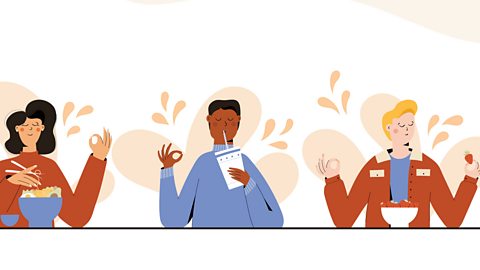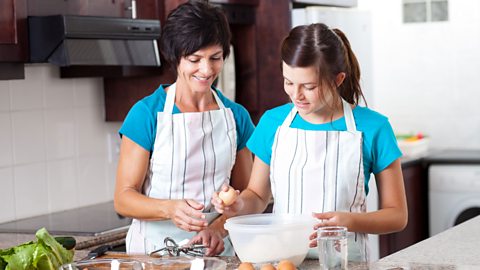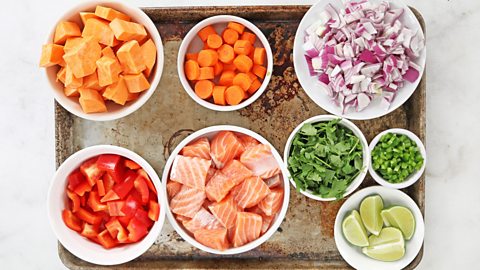Could cooking therapy help your mental health?
The research is in its infancy, but there are a growing number of therapists using cooking to help people with burnout, anxiety and other mental health issues.

Mental Health Awareness Week starts on May 9, providing a timely reminder to consider new ways of caring for our mental health in challenging and uncertain times. Statistics show poor mental health is an issue that affects many. In England alone, itÔÇÖs said that one in four adults and one in ten children will .
There are, many well-established types of therapy out there ÔÇô from online CBT apps to counselling. And, cooking therapy is nothing new for some experts, with occupational therapists frequently using it as part of a . However having therapists who are hoping to use culinary/cooking as a sole type of therapy, is relatively innovative.
Royal College of Occupational Therapists, professional adviser Dr Sally Payne explains: ÔÇ£Cooking and baking are widely used in occupational therapy, both for the purposes of pleasure and to help with peoples mental health. ItÔÇÖs easily adapted to meet a person's needs and research indicates that cooking has benefits for health, wellbeing and social connectivity. We are delighted that people are joining occupational therapists in recognising the therapeutic value of cooking.ÔÇØ
So, could cooking therapy (or culinary therapy) soon be added to the list of established therapies?
What is cooking therapy?
For the most part, itÔÇÖs a practical therapy session where you cook alongside a therapist. As the session develops, you open up, whether thatÔÇÖs via chatting or through non-verbal communication. The experts we spoke to explained that the way you cook or work in the kitchen reveals a lot about how youÔÇÖre feeling.
ItÔÇÖs used as a treatment for numerous mental health issues ÔÇô including grief and loss, anxiety and depression. A versatile treatment, in Middlesbrough itÔÇÖs being used to help young adults with various mental health issues to .While there is limited scientific research on the benefit of cooking therapy, there is including evidence on how .
Professor Kocet, from the Chicago School of Professional Psychology is currently adding to the evidence. ÔÇ£I'm doing a research study which looks at cooking as a mitigating factor in how we managed mental health symptoms during COVID-19. I want to look at how people used cooking and even baking to cope with stress, anxiety and depression during the pandemic and I'm doing qualitative interviews of individuals to investigate how cooking helped.ÔÇØ
With a PhD in counsellor education, he has been involved with cooking therapy since 2014 and is passionate about the subject ÔÇô ever since he himself took cookery classes back in 2006.
ÔÇ£Every single person I told [about the classes] would say 'oh, cooking is so therapeutic for me'. And the light bulb went off and I thought, in our field, we have art, dance and music therapy, but why hasn't anyone done cooking therapy or culinary therapy?
Later Kocet developed a graduate counselling course in culinary therapy. The course involved teaching mindful cooking and eating, as well as nutrition ÔÇô with a registered nutritionist on hand.
Now, Kocet incorporates culinary therapy into his counselling sessions. ÔÇ£The American counselling Association Code of Ethics prohibits a counsellor from solely doing any new forms of therapy that lack in research,ÔÇØ he explains. ÔÇ£So I use it to support and enhance the therapeutic relationship already existing between the patient and the counsellor.ÔÇØ
Related stories
How does the therapy work?

Charlotte Hastings, runs Kitchen Therapy in the UK and like Kocet, her involvement with the therapy began when she merged two of her interests, ÔÇ£I trained as a psychotherapist and I also started teaching cookery in night class community kitchensÔÇĞ I saw that they worked together.ÔÇØ
Hastings agrees the therapy is similar to music, art and drama therapy. ÔÇ£The fact itÔÇÖs expressive means youÔÇÖre often communicating in a non-verbal way and picking up on different messages. But I guess the difference is, it's very practical,ÔÇØ says Hastings, explaining that you leave the session with food to consume.
The fact itÔÇÖs less formal than a traditional ÔÇİtalk therapyÔÇÖ helps, she says. ÔÇ£If you've got a lot of problems, then for some people, to sit down still and talk, it can actually exacerbate those issues and make you feel worse.
ÔÇ£If IÔÇÖm working with a teenager, I would find out about them in talk therapy first. Then we move onto it [making food together]. Because we're not eyeballing each other, and we're achieving something and it's fun, we can be on the same level, there's a real equality that happensÔÇĞ I'll have the recipe and have the ingredients, but I can enable that person to do something for themselves ÔÇô so thereÔÇÖs elements of ÔÇİÔÇÖ. It provides a safe space.ÔÇØ
Top tips for improving wellbeing through cookery

Practice mise en place
ÔÇ£I think probably all professional chefs are trained on this,ÔÇØ says Kocet. ÔÇ£It's French for 'everything in its place'. A chef reads a recipe multiple times and then organises their ingredients before starting.ÔÇØ The process itself is soothing and helps people practice mindfulness, says Kocet.
ÔÇ£I think a common reason people feel stressed by cooking is because they're literally running all over the kitchen and maybe not reading the recipe, and then halfway through it says they need an item and then they realise they don't have it.
ÔÇ£It's a good lesson in life to centre yourself. In the kitchen this means reading the whole recipe before you start cooking, and then breaking up the recipe into small steps and prepping all the ingredientsÔÇĞ If youÔÇÖre hyper-organised, youÔÇÖll love mise en place. It's very comforting and youÔÇÖll feel organised.ÔÇØ
Cook what you love ÔÇô not what you should make
ÔÇ£Make something really simple that you really like,ÔÇØ suggests Hastings before adding: ÔÇ£DonÔÇÖt fall into the trap of thinking 'oh, I'll cook that because it'll be really good for me' or 'that looks really amazing and I want to cook this clever dish'. That wonÔÇÖt connect with you and you want it to mean something and bring comfort.
ÔÇ£Perhaps a dish reminds you of something or someone and you're going to take the time to reflect whilst you're cooking. This is time for nourishment, not just eating a meal.ÔÇØ
If youÔÇÖre struggling with a bereavement this can help, says Hastings. ÔÇ£We can connect with those memories [through making dishes that remind you of loved ones]. It allows us to recognise that when someone's in your heart, they are always here with you. I do this when I make recipes linked to my grandma ÔÇô it helps remind me what she meant to me. Not just what she taught me when cooking, but actually how she looked after me and that nurturing I received.ÔÇØ
Practice mindful eating (and even washing up)
Mindful eating is a tool for relaxation and awareness, taking your time to focus and appreciate the food you are eating. Kocet explains: ÔÇ£I do a chocolate meditation where I have students eat the food very slowly. Years ago, I did this when I was a therapist in a psychiatric hospital working with adolescents. I gave them a small chocolate and then I guided them through taking the wrapper off, smelling the chocolate, then putting it in their mouth and not chewing it. I explained that when we eat mindfully, we can eat slower, it's better for our digestion. But, it's also better for our mental wellbeing ÔÇô as itÔÇÖs a form of meditation.ÔÇØ
ÔÇ£After you cook, instead of just throwing the dishes in a dishwasher, use it as a meditation tool too,ÔÇØ adds Kocet. ÔÇ£Hand-wash the dishes and just be aware of the water and the soap. Wiping every dish can also be a symbolic representation of cleaning our emotional space as well as the dish itself.ÔÇØ
Think outside of the physical act of cooking
Whether itÔÇÖs reading a cookery book cover-to-cover to help soothe you, or talking about your favourite childhood food, ÔÇ£Cooking therapy does not necessarily have to involve cooking,ÔÇØ says Kocet. ÔÇ£It can just be discussions around food and eating and a person's relationship with food.ÔÇØ
You can take it a step further, carrying out your own food-related homework. ÔÇ£ThereÔÇÖs a children's book that was published years ago called Tear Soup,ÔÇØ says Kocet. ÔÇ£I typically will read that story whether I work with children, adolescents or adults. It's about a woman who experiences a loss and so she must make tear soup as a way to copeÔÇĞ After I read the story, I have my students write their own recipe for tear soup and what that means for their own grief.ÔÇØ
The result isnÔÇÖt the point
ÔÇ£When you see little kids, they don't know they can't cook so they're brilliant. They just get stuck on in. They don't worry about whether something's perfect or notÔÇĞ Think about when you make a mud pie as a child, no one told you how much to add or what to do,ÔÇØ says Hastings, explaining that to improve your wellbeing through food, you should remove the pressures associated with the end result.
Kocet agrees and explains that even if you do make a mistake it can be a useful tool for helping improve your self-confidence and resilience. ÔÇ£In one class, a student was assigned a pear cake. He messed the recipe up and I could see he was very dejected. I encouraged him to make something else with the ingredients. At the end, when we were sampling all the food, the class said their favourite was the spontaneous dish he made. The look on his face was pure shock - that something that originally didn't work out, turned out really well.
ÔÇ£That epitomised why cooking therapy can be so powerful. If you make a mistake cooking, how can you turn it around? ItÔÇÖs also a metaphor for other parts of your life. It's okay to make a mistake, whether thatÔÇÖs professionally in your work or relationships,ÔÇØ finishes Kocet.